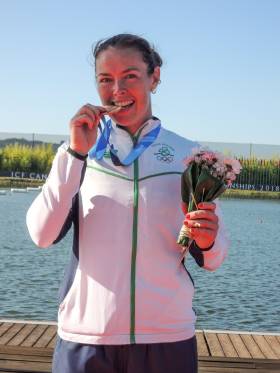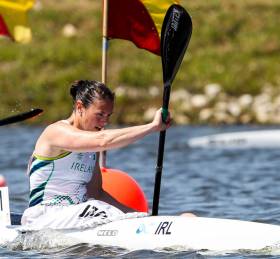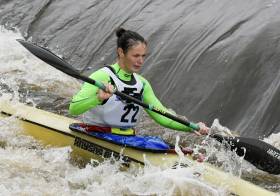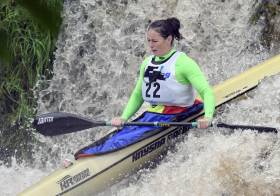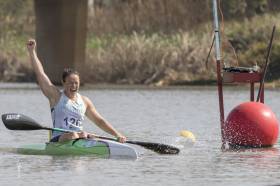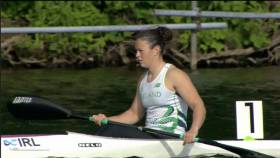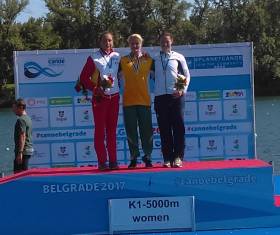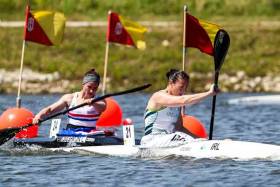Displaying items by tag: Jenny Egan
Jenny Egan Takes Bronze Medal at Canoe Sprint World Championships
#Canoeing: Jenny Egan produced a spirited fightback to take a bronze medal at the canoe sprint World Championships – her first in this championships. The Ireland K1 paddler fell back after a disappointing start at Montemor O Velho and had to claw her way from 15th to third. Lizzie Broughton of Britain sprinted away to take gold, with Maryna Litvinchuk of Belarus taking silver. Egan took bronze at the canoe marathon World Championships in 2017 and will compete in the marathon event again next month.
Canoe Sprint World Championships, Montemor O Velho, Portugal (Irish interest)
Women
K1 5,000 metres: 3 J Egan 24 min 15.08 sec.
Jenny Egan Takes Third World Cup Medal in China
#Canoeing: Ireland's Jenny Egan finished third in the canoe marathon World Cup race over 26.2 kilometres in Shanghai today. This was the final race of the International Canoe Federation series in Shaoxing and Shanghai. Egan took a silver and a bronze in the first and second races. The three medals brings her tally of medals in marathon events this year to six.
Egan Takes Second World Cup Medal in China
#Canoeing: Jenny Egan took bronze at the canoe marathon World Cup in Shanghai in China. Kristina Bedek of Serbia won the 3.6 kilometre K1 race, with Lizzie Broughton of Britain and Egan filling the next two slots in a close finish. Egan had taken silver on Monday at the World Cup in Shaoxing.
Ireland also had another good finish in Shanghai. Barry Watkins took fourth in the men’s race.
Jenny Egan Takes Silver in China World Cup
#Canoeing: Jenny Egan took a silver medal at the ICF Marathon World Cup in Shaoxing, China. Anna Adamova Koziskova of the Czech Republic won a sprint finish with the Ireland athlete at the end of the 26.2 kilometre race. Lizzie Broughton of Britain was third.
This World Cup is new on the international circuit and while the top marathon canoeists have been invited, not all have travelled. Unusually for this discipline, there has been prize money for competitors.
Liffey Descent 2017 Draws Strong International Entry
#Canoeing: It’s 30 kilometres of high-adrenaline challenge; two hours of torture for arm muscles. Yes, it is time for the Liffey Descent, when hundreds of competitors will career down the river from Kildare into Dublin.
The race on Saturday, September 23rd, runs from Straffan to Garda Boat Club in Islandbridge. Canoeists in everything from wildwater boats to the speedy racing kayaks (K1 and K2) will carefully negotiate or plunge over 10 weirs. Above the dam in Leixlip they must pull their boat out of the water and carry it for 500 metres. The top competitors will take just two minutes before plunging their craft into the water again.
Capsizes are inevitable, and spectators have a ringside view of the unexpected swims at the start, at 12 o’clock at the bridge at the K Club, and down the course at weirs at Lucan and Palmerstown.
Jenny Egan, the bronze medallist at the World Marathon Championships in South Africa last weekend, will be a star attraction. “I’m really looking forward to it,” said the Ireland international. She won the women’s K1 in the Liffey Descent last year.
Competitors from Spain, Denmark, Germany, Hungary, South Africa and Britain will line up with paddlers from all over Ireland in an event which has been running for more than five decades.
“We will have GPS trackers on selected lead competitors and internationals so the public can view their profiles and follow every step of their journey live online,” says Shane Cronin, the new Liffey Descent coordinator.
“We have world-class competitors involved and there could be very fast times. I think this could be one of the best races in recent times.”
Jenny Egan Takes Bronze Medal at World Marathon Championships
#Canoeing: Ireland’s Jenny Egan took a bronze medal in the K1 at the Canoe Marathon World Championships in Pietermaritzburg in South Africa. Lani Belcher, who competes for Britain, took gold at the head of a group of three which broke away from the rest of the field. Vanda Kiszli of Hungary took silver.
Egan’s World Championship medal capped a season in which she won gold and bronze in the K1 5,000 at canoe sprint World Cup events.
Rónán Ó Foghladha took fifth in the men’s junior K1.
Canoe Marathon World Championships, Pietermaritzburg, South Africa (Irish interest)
Men - K1: 19 B Watkins 2:15.26; 24 P Egan 2:19.07. Junior: 5 R Foley 1:45.48.
Women – K1: 1 Britain (L Belcher) 2 hrs 5 min 04 seconds, 2 Hungary (V Kiszli) 2:05.10, 3 Ireland (J Egan) 2:05.39; 17 A Smith 2:17.20
Egan Tenth In Dramatic World Championship Final
#Canoeing: Ireland’s Jenny Egan finished 10th in the women’s K1 5,000 metres at the canoe sprint World Championships in Racice in the Czech Republic today. In a dramatic race, Dora Bodonyi of Hungary came out with the gold medal after a long battle with Tabea Medert of Germany, who took silver. Lani Belcher of Britain gritted it out as she found her way through the field and won bronze – near the end she clashed with Iuliana Salakhova of Russia, leaving the Russian in the water and out of the race.
Egan’s chances suffered in rough-and-tumble early stages. She fought hard through the race but could not catch up with the leading group.
Canoe Sprint World Championships, Racice, Czech Republic (Irish interest)
Women
K1 5000 Final: 1 Hungary 23 min 17.862 sec, 2 Germany 23:19.214, 3 Britain 23:28.236; 10 Ireland (J Egan) 24:34.562.
Egan Qualifies for World Championships Semi-Final
#Canoeing: Jenny Egan has qualified for the semi-finals of the K1 200 metres at the Canoe Sprint World Championships. The Irish paddler finished seventh in her heat this morning in Racice in the Czech Republic, taking a place as one of the fastest losers. Her semi-final is secheduled for 2.44 Irish time on Saturday.
Ireland’s Patrick O’Leary will compete in the A Final of the KL3 200, part of the Paracanoe World Championships, also in Racice. O’Leary finished third in his semi-final. His final is scheduled for 1.30 Irish time on Saturday.
Jenny Egan Takes Bronze at World Cup in Serbia
#Canoeing: Ireland’s Jenny Egan took a bronze medal at the canoe sprint World Cup in Belgrade in Serbia today. Australia’s Alyssa Bull took the gold in the K1 5,000 metres from Laia Pelachs of Spain.
Egan (30) started her season with a win in the K1 5,000 at the first World Cup in Montemor-O-Velho in Portugal. She also competed in the second World Cup in Szeged in Hungary.
Canoe Sprint World Cup, Belgrade (Selected Results; Irish interest)
Women
K1 5,000 – Final: 1 Australia (A Bull) 22 minutes 26.080 seconds, 2 Spain (L Pelachs) 22:27.83, 3 Ireland (J Egan) 22:35.60.
Gold for Jenny Egan at World Cup in Portugal
#Canoeing: Ireland’s Jenny Egan won the K1 5,000 metres at the first canoe sprint World Cup in Portugal today. The 30-year-old paddler had just .77 of a second to spare over Spain’s Estefania Fernandez after the long battle. Lizzie Broughton of Britain was third.
Canoe Sprint World Cup, Montemor-O-Velho, Portugal Day Two (Irish interest)
Women
K1 200 – A Final: 9 J Egan 42.743.
K1 5,000 – Final: 1 Ireland (J Egan) 22 mins 52.8 seconds, 2 Spain (E Fernandez) 22:53.57, 3 Britain (L Broughton) 22:56.98.


























